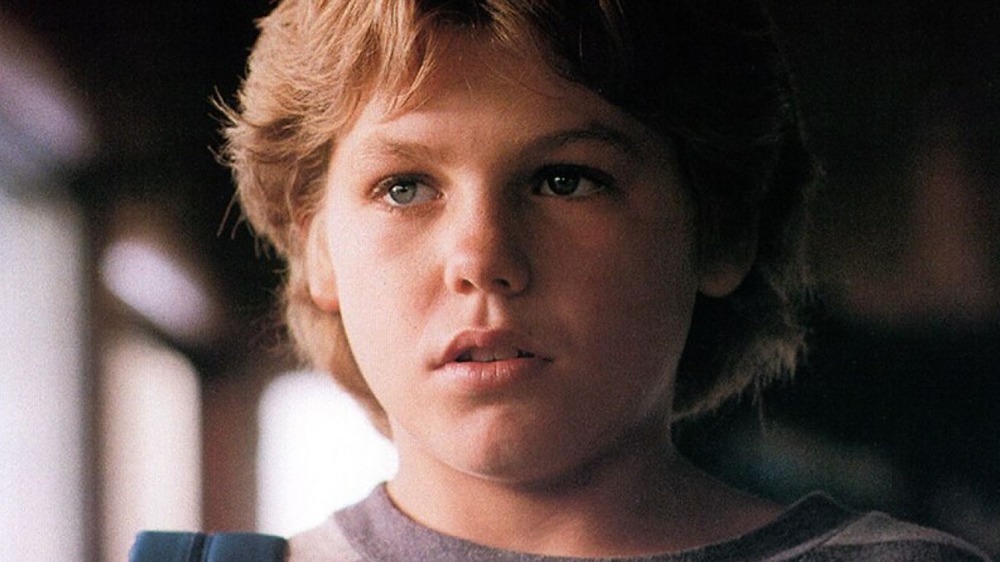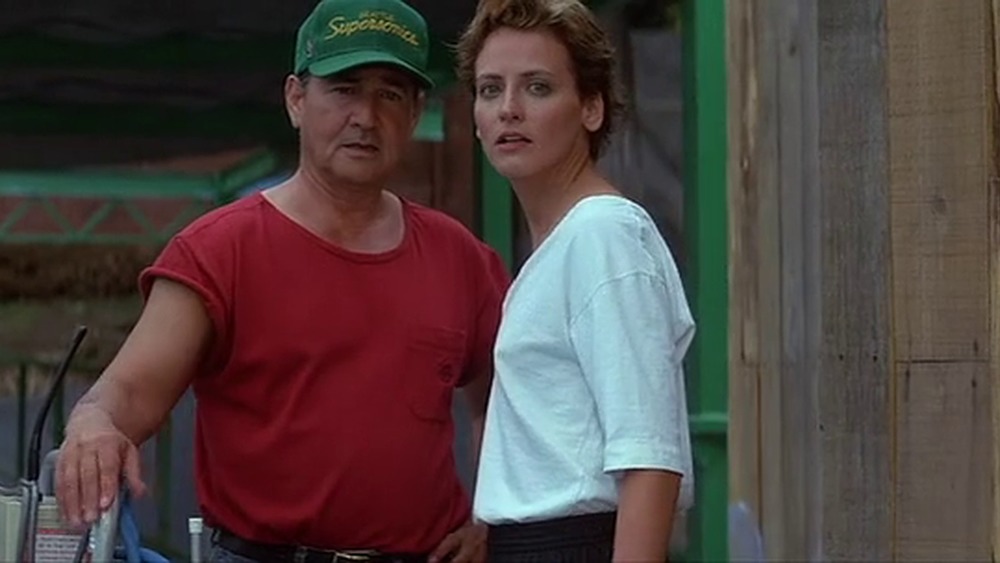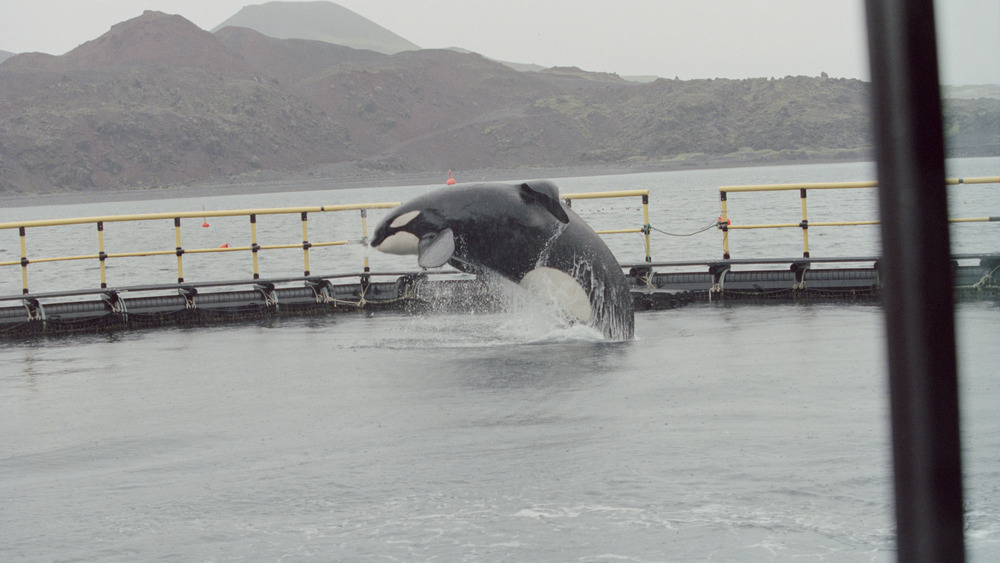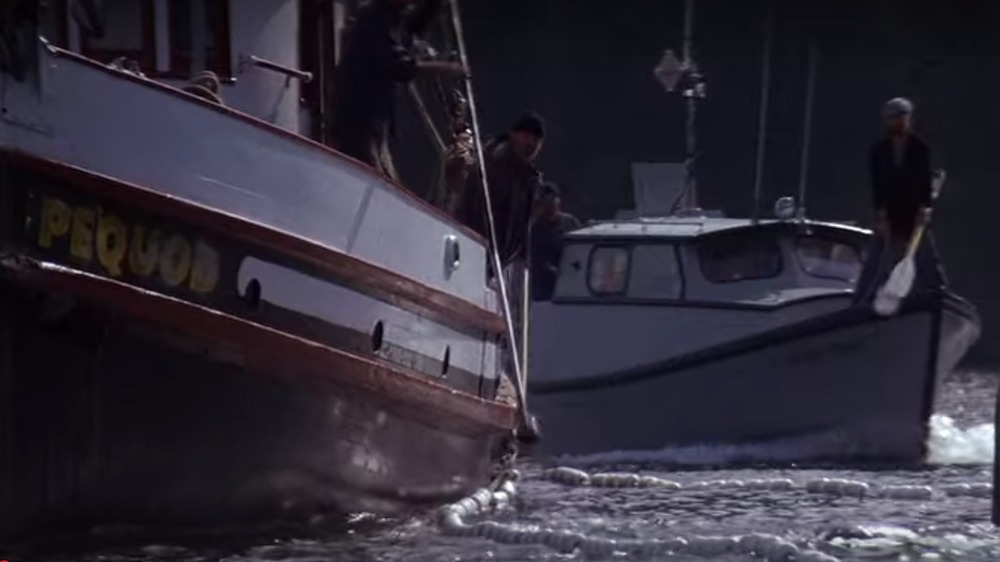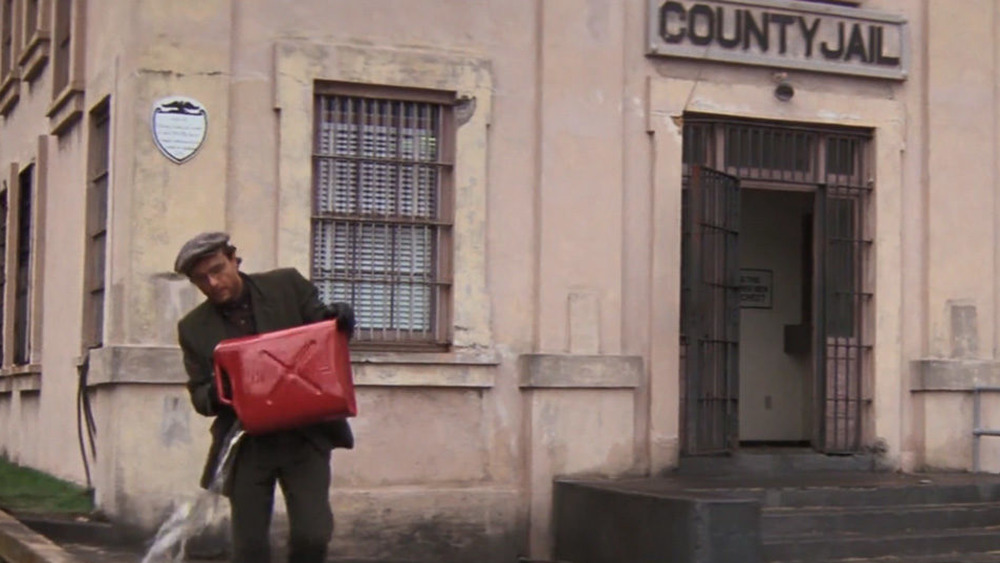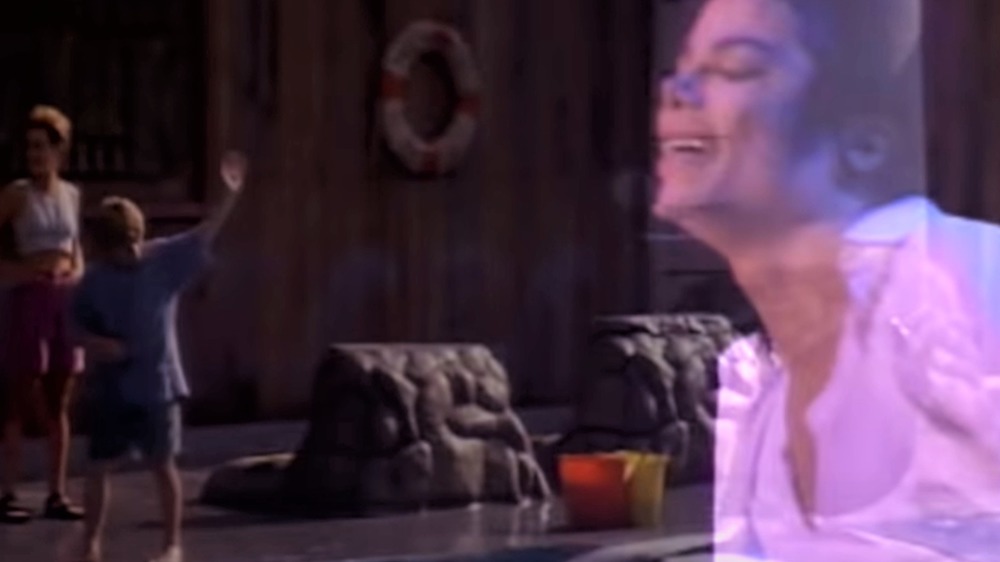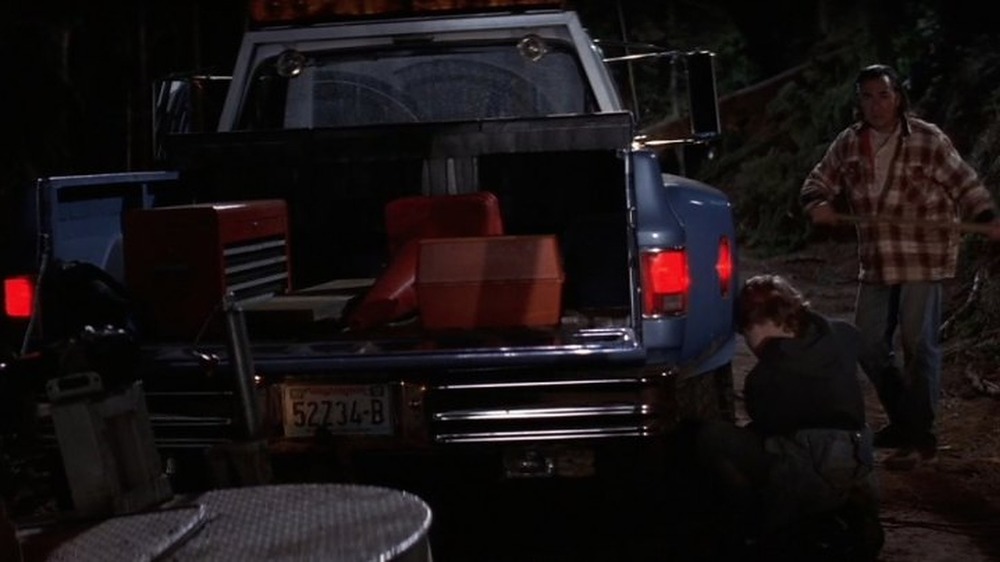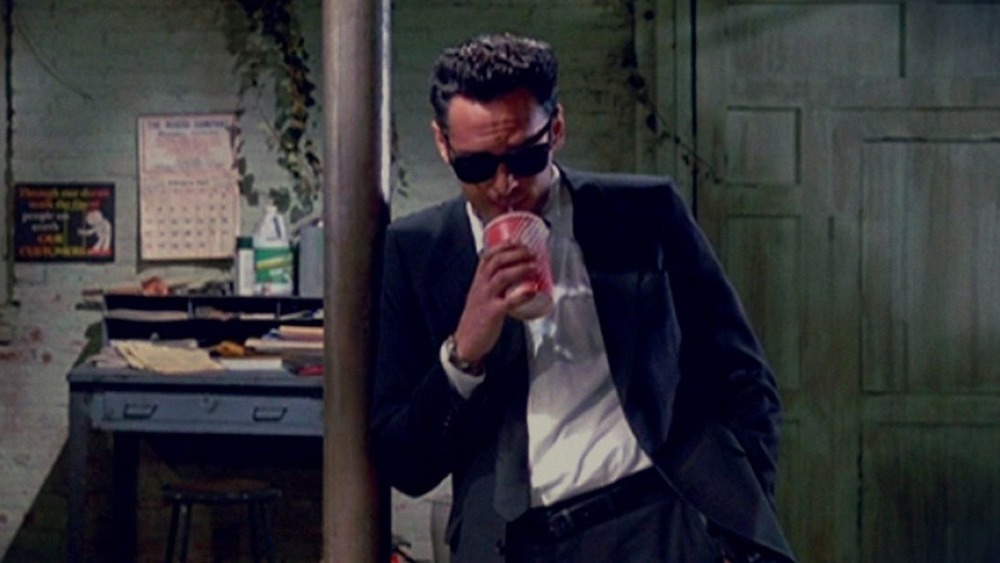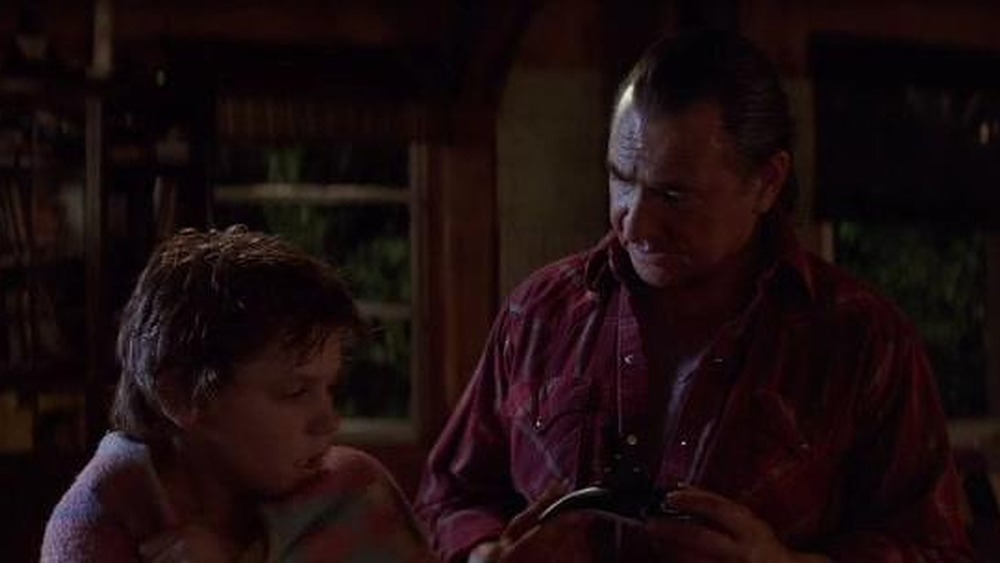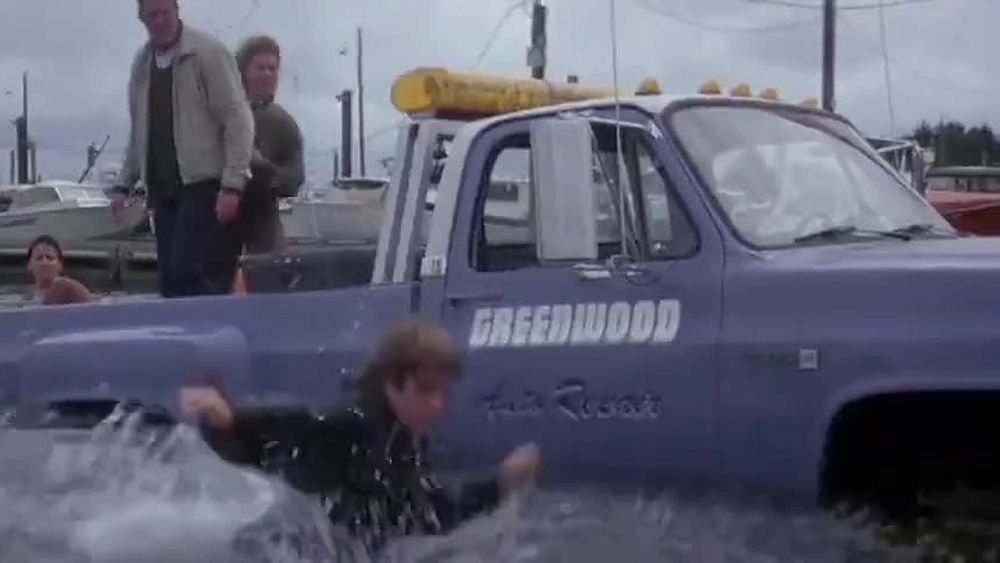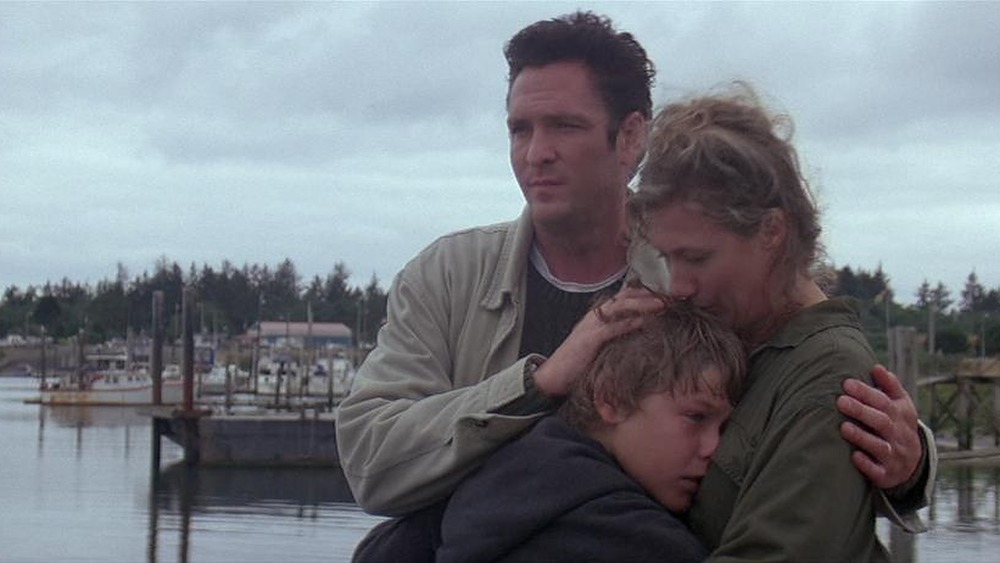Things Only Adults Notice In Free Willy
1993's Free Willy is all about what adults don't notice. Those who are supposedly older and wiser, with the exception of an integral few, are uninterested in anything beyond their rigid conception of reality — homeless children and captive creatures are left to fend for themselves. In contrast to this carelessness, Jesse, the 12-year-old protagonist, understands that home isn't simply a place to stay. In Willy's case, in fact, his place of residence is the thing keeping him from truly being at home. Jesse's experiences as a homeless orphan uniquely equip him to understand Willy's predicament, in a way that an older generation focused on profit, marriages, and job security isn't able to do. It is only through Jesse's young, off-kilter perspective that WIlly is freed.
Free Willy is a coming-of-age story for everyone involved. Jesse reacquaints his foster parents and fellow trainer Rae with a childlike sense of empathy and love, helping them discover real maturity. On the other hand, Randolph, Rae, the Greenwoods, and, most importantly, Willy, help Jesse discover a more mature and healthy notion of family. The divide between the old and young is just as pronounced in Free Willy's audience as it is in its story — much of this movie goes right over kids' heads. We're here to explore everything in Free Willy that only the adults notice, from its marriage-centric jokes to its depiction of familial struggle.
Dated paraphernalia
Decades have passed since Free Willy debuted, making it a treasure trove of vintage objects for adult viewers to rummage through. Younger fans might just be confused, however. There may be some dads who still keep Rolodexes in their home offices, but by and large, most kids either have to ask what that big clunky contraption is on Dwight's desk, or fail to register it at all. And while many truckers still use CB radios — or at least still do so in TV and movies — few non-truckers have one in their own vehicles today, like car enthusiast and mechanic Glen Greenwood does.
One of the standout elements of Randolph's appearance isn't just out of vogue — it's utterly obsolete. His Seattle Supersonics hat, which he proudly plops on Jesse's head at one point, represents a basketball team, once popularly called the Sonics, that only existed until 2008. The Sonics departed Seattle for Oklahoma City in 2008, where they now play as the Oklahoma City Thunder.
The real whale is in the 27 Club
In 2020, Free Willy turned 27. This made the film the same age Keiko, the whale who played Willy, was, when he died off the coast of Norway shortly after being released into the wild. This puts Keiko in the "27 Club," an eerie group of movie stars, musicians, and other well-known celebrities who died at 27 years old.
The superstition surrounding these deaths extends beyond the tragic serendipity of their ages. People were understandably rattled when Jim Morrison, Janis Joplin, Brian Jones, and Jimmy Hendrix passed away within just a few years of each other, all at the same age. The first two died of heroin overdoses, while the latter two suffered, respectively, a dubious "death by misadventure" in a home swimming pool, and a suspected drug overdose that has inspired extensive conspiracy theories over the decades.
The lost souls of this club died far too young, often after long battles with addiction and mental health. Keiko, who still depended on humans for food and companionship at the time of his death, was young by wild orca standards, but old for an orca being held in captivity. When Keiko died, he was, sadly, lost somewhere between youth and maturity, much like his fellows in the 27 Club.
Moby Dick vs. Free Willy
The boat that captures Willy in the opening scene of the film is named Pequod, a nod to Herman Melville's 1851 novel Moby Dick: The infamous Captain Ahab helms a whaling boat of the same name. Coincidentally, the chief mate of the Pequod, a man named Starbuck, is the namesake of the popular coffeehouse chain owned by Howard Schultz. Schultz was also the owner of the Seattle Supersonics, who Randolph supports, and was, in fact, the man who sold the team to a new city.
In Moby Dick, the Pequod has been at sea for years, to the point that all three of its masts are replacements, and many parts of the craft that have been damaged in action have been replaced by parts of the beasts the crew has conquered. Ahab is on a mission to get revenge on the whale that took his leg, but his fervor threatens to destroy him.
Unlike Captain Ahab, Jesse's dogged quest is redemptive, not vengeful. Nor is it as steeped in symbolism as the journey at the heart of Melville's novel. But there is meaning in it all the same: Dial, the villain of Free Willy, conjures an enemy out of an animal, and, like Ahab, maintains a single-minded vendetta that ultimately costs him. Jesse, on the other hand, conjures a friend.
The old Goonies stomping grounds
If there's a lot in Free Willy that goes over the heads of today's youngsters, then there is even more they miss in 1985's The Goonies. Funnily enough, there are numerous thematic and production-related ties between the two films, which pretty much every modern kid will miss.
Both The Goonies and Free Willy were shot in Astoria, Oregon. Astoria celebrates its own "Goonies Day" every year on June 7, and is home to the Oregon Film Museum, located in the Clatsop County Jail, site of the famous Goonies jailbreak. The museum is chock-full of sets, exhibits, and artifacts from Oregon films like Free Willy, The Goonies, One Flew Over the Cuckoo's Nest, and more. There are even more connections behind the scenes: Keith Walker, who co-wrote the screenplay for Free Willy, also portrayed Irving Walsh in The Goonies.
Fans have also pointed out that Jesse's somber goodbye to Willy mirrors Mikey's last words to One-Eyed Willy the pirate in The Goonies: Both of them murmur, "Bye, Willy," and follow it up with an expression of fondness.
Whale songs, courtesy of Michael Jackson
Michael Jackson is still a household name, but even those who know his face or story can easily be too young to identify his music. Generations previous, however, will recognize the stylings of the King of Pop at the opening and conclusion of Free Willy.
Jackson's "Will You Be There," also credited as the "Theme from Free Willy," won MTV's Best Song from a Movie award in 1994, and was featured on the 1999 compilation album "The All Time Greatest Movie Songs," released by Sony Music. The official music video intersperses shots from the film with Jackson's own singing and dancing. The song eventually went platinum, and perhaps most meaningfully, was performed at the public memorial after Jackson's death by Jennifer Hudson.
"Will You Be There" had immense significance to Jackson's career for another reason as well. The prolific artist used this song, originally from 1991's Dangerous, to launch his record label MJJ/Epic that same year.
The meaning of family
One of the most heart-wrenching (and heart-warming, in the context of the film's arc) moments in Free Willy comes when Jesse asks for Glen's assistance in saving Willy's life. He bargains with him desperately, saying that if he helps them, he'll do anything. Glen asks what it is that Jesse thinks he wants from him, and Jesse replies, "I don't know. I don't know what you want from me."
Jesse doesn't quite understand yet that familial love isn't transactional. He's never had a family of his own to learn from — the first lesson he gets is from the Greenwoods, Rae, and Randolph, who teach him about Orca pods and lore. In this same scene, though, Jesse demonstrates that he has indeed learned a lot about family. "Look," he explains to Glen, "I gotta look out for Willy, and I gotta do what's best for him. Do you understand?"
As he makes this plea, Jesse himself sounds like a parent. Of course Glen understands: He's been trying, despite Jesse's confrontational behavior, to do what's best for his adoptive son this whole time! In this scene, we see just how far Jesse has come and how vulnerable he still is. Real love, he has slowly learned, isn't about trying to get something from someone. This is why he still loves Willy just as much, even after the whale failes to perform his conditioned routine in front of an audience.
Stars of the past, present, and future
Like Rolodexes and CB radios, there are many stars in this film kids won't recognize. Many of them have, however, enjoyed major success in recent years. Lori Petty, who portrayed Rae the trainer in Free Willy, went on to play Lolly Whitehill in 2013's Orange is the New Black. The actress who played Annie Greenwood, Jayne Atkinson, eventually landed the exciting role of Secretary of State Catherine Durant in Netflix's House of Cards, also released in 2013.
Other stars were up-and-coming when Free Willy came out, and have since become generational favorites. In 1991, Michael Madsen, who plays Jesse's adoptive father Glen Greenwood, starred in his first major film role: Jimmy Lennox in Thelma and Louise. The next year, he starred in 1992's Reservoir Dogs, in which Madsen plays the sadistic, mass-murdering, policeman-kidnapping Mr. Blonde. He has since appeared in movies as wide-ranging and acclaimed as Sin City and Once Upon a Time in Hollywood.
Which came first, the orca or the human?
Randolph's stories are a key element in Jesse's development from scrappy homeless youth to enthusiastic son, friend, and caretaker. Consider the scene in which Randolph details the lore of the whales and the history of his people, the Haida. This discussion flows into another, in which Jesse excitedly relays the story to his surprised and excited adoptive parents.
In this legend (as Randolph tells it), a young Haida named Natsilane loses his way while hunting fish with other braves, and nearly perishes in a massive storm. Afterward, he still can't find his group — all he finds is a huge log on the beach. He carves a beast on the log that comes to life as the first orca after Natsilane prays over it, leaping into its true home in the ocean.
There's just one problem, which adults might pick up on: Earlier in the film, Randolph explains that orcas' eyes "discovered the stars long before man was even a whisper on Mother Earth." This wouldn't make sense if it was, in fact, man who created the first orca.
Regardless of this error in continuity, this moment is magical, and introduces a prayer that Jesse repeats during the climax of the film, when Willy, like the first orca, makes his supernatural leap into the ocean.
Car trouble
Glen keeps a framed picture of his car in his office, and its crisp red color quickly catches Jesse's eye. Glen calls it a "classic," reminiscing about how he spent a year and a half putting it together. It was the love of his life ... but he had to sell it. When Jesse asks why, Glen explains that you can't have more than one love of your life, implying that he sold it to make his wife happy. Though it's not definitively clear what sort of car this lost beloved was, adults might recognize it as something very close to a classic Thunderbird.
Glen is obviously a car enthusiast: He owns Greenwood's Auto Repair, after all. And yet, Glen ends up losing a second car for someone he loves at the end of the film. First, Jesse steals his truck, and Glen agrees to help him despite this transgression — significant in its own right. But this is nothing compared to the eventual fate of the truck. Once Glen agrees to help Jesse, Randolph, and Rae free Willy, he goes all-in, driving it through a gate and into the waters of the marina to secure Willy's safe escape. Talk about devotion.
Wedded and witty
While it is true that love isn't transactional, that doesn't mean that it doesn't require compromises every now and then. Glen and Annie appear to be quite happily married, but Glen doesn't pretend that married life is a bed of roses. This character trait doesn't just work for laughs: It makes Glen the ideal person to teach Jesse about love.
Love isn't perfect. It can mean saying goodbye. It can mean making sacrifices. But it is, ideally, worth it. Glen's line about giving up his car for his wife is amusing and meaningful to older viewers because they can identify similar choices in their own lives, and how they were worth it in the end, despite the bickering they might have caused.
Speaking of bickering, Glen has his own humorous take on that, too: When Jesse asks if he and Annie ever fight, Glen chuckles and comments that they schedule one every other month or so. It's a wry nod to the way couples get to know each other and thereby settle into routines (not necessarily a bad thing) to serve the common good, and an important lesson for Jesse to learn. Love isn't easy, but it's worth it.
Orcas and harmonicas
Jesse's harmonica playing is one of the many elements of his personality that first endears Willy to him. Neither of the two speaks the other's language, but over time, they develop a communication of their own outside of biological categories altogether. This secret language rests on the notes of the harmonica, demonstrative hand motions, and the genuine kinship of lonely hearts literally and figuratively set adrift by circumstance.
Willy is not the last whale to have taken a liking to the musical stylings of a harmonica player. In a piece about the magic and mystery of whales adapted from his 2015 book Beyond Words: What Animals Think And Feel, Carl Safina explores the story of an ostensibly violent pod of whales in Argentina. The members of this group regularly pull sea lions right off the shore, yet gather calmly to hear a park ranger play harmonica from a kayak right in the water. That ranger has been seen clapping his hands over the sea to attract the orcas, much like Jesse himself does by the side of the tank at the Northwest Adventure Park.
Mothers and frauders
The villain of the movie, Dial, is obsessed with money and profit, with no regard at all for the emotional or physical wellbeing of the marine life under his care. Resentful of Willy from the beginning for the extreme cost of maintaining his tank and feeding schedule, Dial snaps when the whale, distressed by the aggressive crowd of park-goers pounding on his tank in anticipation of the first "Willy Show," fails to perform.
Such an expensive asset (or liability, in Dial's eyes) must also cost a lot to insure. This is something few kids grasp. Adults, on the other hand, have a better (though hopefully not too good) understanding of insurance fraud. Not only do they have knowledge of the financial mechanisms that would offer Dial a million-dollar payout for Willy's death, but they also understand Dial's revelation that he doesn't have theft insurance.
Deciding on insurance coverage is an exercise in risk assessment. It's so unlikely that someone could successfully pull off a whale heist that spending money on insurance against that eventuality just wouldn't be worth it. Children might not understand this nuance, but adults get a good laugh out of it — and a richer understanding of Dial's comeuppance.
